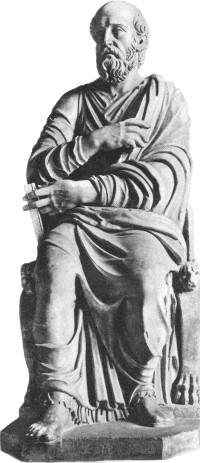trinitarian or unitarian? 1 – Irenaeus
“Both the Lord [Jesus], then, and the apostles announce as the one only God the Father…”
“Both the Lord [Jesus], then, and the apostles announce as the one only God the Father…”
“…the Son was not ashamed to ascribe the knowledge of that day to the Father only…that we may learn through Him that the Father is above all things.”
 Was Hippolytus a trinitarian or a unitarian? In the last two posts, I’ve argued that he was the latter.
Was Hippolytus a trinitarian or a unitarian? In the last two posts, I’ve argued that he was the latter.
In the most recent translation of his Against Noetus, though, the translator thinks he is a trinitarian. He entitles this section, “The three Persons of the Trinity are One God”. (p. 74) Is he right? Here’s the passage, pretty much the whole chapter:
Well then, brethren, all this is what the Scriptures point out to us. This economy that blessed John, too, passes on to us through the witness of his Gospel, and he maintains that this Word is God… [John 1:1]
But then, if the Word, who is God, is with God, someone might well say: “What about this statement that there are two gods?” While I will not say that there are two gods – but rather one – I will say there are two persons; and that a third economy is the grace of the Holy Spirit. For though the Father is one, there are two persons – because there is the Son as well: and the third too, – the Holy Spirit. The Father gives orders, the Word performs the work, and is revealed as Son, through whom belief is accorded to the Father. By a harmonious economy the result is a single God. Read More »trinitarian or unitarian? 11 – a trinitarian passage in Hippolytus?
 Against Celsus is not the only important surviving book by Origen. Origen’s On First Principles is often called the first systematic Christian theology. It was written some time before 231. It is a bold and wide-ranging work, and in Origen’s day Christian theologians could speculate a fair amount.
Against Celsus is not the only important surviving book by Origen. Origen’s On First Principles is often called the first systematic Christian theology. It was written some time before 231. It is a bold and wide-ranging work, and in Origen’s day Christian theologians could speculate a fair amount.
But the curtain was brought down on this era of freedom by ecclesial-political events of the fourth century. While many still considered Origen a great scholar, the atmosphere was such that one might lose one’s church career if people thought you were too sympathetic to his views.
Among his admirers was the great scholar Jerome (translator of the Latin Vulgate Bible), but Jerome had do distance himself from Origen lest the heresy hunters get him. But still, people wanted to read Origen. Answering this need, Rufinus (d. 410) translated Origen’s On First Principles into Latin. Problem is, Rufinus systematically cut out and/or changed numerous passages that would not fit the new Pro-Nicene hegemony.
How do we know this? Because Rufinus tells us! He argues that heretics must have corrupted Origen’s works, since there just could not be a difference between those and the new catholic orthodoxy. Also, we have from other sources, e.g. letters of his contemporaries, the Greek texts of some of the cut and altered passages. In the excellent modern edition of the book, the editor-translator restores these to the text. Sadly, Rufinus’s Latin version is the only complete version we have of Origen’s book, so as it stands, the book is riddled with suspicious passages that don’t fit what we otherwise know about Origen, but which we have no textual grounds to correct. (On the whole crazy affair, see the above edition, pp. xxxi-lii.)
Here are some of the cut and restored passages; if you’re familiar with the “Arian” controversy and the trinitarian orthodoxy that coalesced and acquired the power of the Roman emperor at the end of the fourth century, you will not need an explanation why Rufinus cut them.
…the Saviour… is an image of God’s goodness, but Read More »trinitarian or unitarian? 7 – Origen uncensored
Here’s a long but engaging interview by Sean Finnegan at his Christian Monotheism website. (Podcast RSS feeds here.) The subject, a young man named Christopher Amelung, underwent the change of theology noted above. He doesn’t recount all of the relevant arguments and exegesis; it’s rather a narrative of his own thoughts, emotions, and relationships. This is not a deconversion story, but a story of a… Read More »Reformed trinitarian to unitarian Christian
“The Church, though dispersed throughout the whole world…has received from the apostles and their disciples this faith: in one God, the Father Almighty…”
A prolific apologist embraces so-called “monarchical trinitarianism,” on which the one God just is the Father, not the Trinity.
 Hippolytus (c. 170-236) is an interesting, if obscure character. He was a presbyter in Rome, and on some reports, was a bishop of Rome – either a pope on an anti-pope, depending on how you look at it (he would have been a rival bishop, if this is true, to either Zephyrinus or Callistus). (See the entry on him in this book, pp. 164-5)
Hippolytus (c. 170-236) is an interesting, if obscure character. He was a presbyter in Rome, and on some reports, was a bishop of Rome – either a pope on an anti-pope, depending on how you look at it (he would have been a rival bishop, if this is true, to either Zephyrinus or Callistus). (See the entry on him in this book, pp. 164-5)
He was especially concerned to combat “monarchian” theology. In my view, it is a huge undertaking to get clear what on just what “monarchian” theology was all about. In any case, it is clear that the Hippolytus re-asserts the two-stage logos theory against it, the same sort of theory we saw in Ireneaus. He may have been a disciple of Irenaeus.
God, subsisting alone, and having nothing contemporaneous with Himself, determined to create the world.Read More »trinitarian or unitarian? 9 – Hippolytus’s two-stage logos theory
 The pagan polytheistic monotheist Celsus presses the attack we looked at last time.
The pagan polytheistic monotheist Celsus presses the attack we looked at last time.
If you [Christians] taught them that Jesus is not his [God’s] Son, but that God is the father of all, all that we really ought to worship him [God] alone, they [Christians] would no longer be willing to listen to you unless you included Jesus as well, who is the author of their sedition. Indeed, when they call him Son of God, it is not because they are paying very great reverence to God, but because they are exalting Jesus greatly. [Origen answers:] We have learnt who the Son of God is, even that he is ‘an effulgence of his glory and the express image of his person’ …and we know that Jesus is the Son come from God and that God is his Father. There is nothing in the doctrine which is not fitting or appropriate to God, that He should cause the existence of an only-begotten Son of this nature. (Against Celsus 8.14, trans. Henry Chadwick, pp. 461-2, bold added)
Celsus pushes the point that a real monotheist would only worship God, and suggests that Christians exalt Jesus at God’s expense. (Never mind how he might reconcile this with his acceptance of traditional polytheism.)
Origen replies Read More »trinitarian or unitarian? 6 – Origen’s Against Celsus – Part 2
 Celsus was a pagan philosopher, essentially a cultural and religious conservative, who wrote a book attacking Christianity, perhaps around 177-80 (though some have argued that it must be no later than 161).
Celsus was a pagan philosopher, essentially a cultural and religious conservative, who wrote a book attacking Christianity, perhaps around 177-80 (though some have argued that it must be no later than 161).
Decades later, it is not clear exactly why, the great Christian scholar Origen (182-254) wrote a massive refutation of this book, quoting substantial portions of it. This is the eight-book Against Celsus, which was probably written aronud 246-8.
There are many, many interesting things in the book. Here’s a quotation relevant to our present series:
[Celsus writes:] If these men [Christians] worshiped no other God but one, perhaps they would have a valid argument against the others. But in fact they worship to an extravagant degree this man who appeared recently [Jesus], and yet think it is not inconsistent with monotheism if they worship His [God’s] servant [Jesus]. [Origen responds:] Read More »trinitarian or unitarian? 5 – Origen’s Against Celsus – Part 1
“The Lord created me at the beginning of His ways in His work: He set me up from everlasting, in the beginning, before He made the earth… he brought me forth.”
 Incredibly, in 1551 they discovered an intact statue of Hippolytus (pictured here). This may exist because he was revered as a martyr shortly after his lifetime.
Incredibly, in 1551 they discovered an intact statue of Hippolytus (pictured here). This may exist because he was revered as a martyr shortly after his lifetime.
In the previous post, we saw that in his theology, the divine (but less divine than God) Logos came to exist from God a finite time ago, so that God could create the cosmos by means of him. On two counts, then, this makes him not a trinitarian – that the “persons” are neither co-equal nor equally divine. But is he a unitarian?
In the most important work we have from him, he says,
The first and only (one God), both Creator and Lord of all, had nothing coeval with Himself… Therefore this solitary and supreme Deity, by an exercise of reflection, brought forth the Logos first… Him alone He produced from existing things; for the Father Himself constituted existence, and the being born from Him was the cause of all things that are produced. The Logos was in the Father Himself, bearing the will of His progenitor, and not being unacquainted with the mind of the Father. For simultaneously with His procession from His Progenitor… He has, as a voice in Himself, the ideas conceived in the Father. …when the Father ordered the world to come into existence, the Logos one by one completed *each object of creation, thus pleasing God. …[God, via the Logos] formed the ruler of all [creation, i.e. Adam]… The Creator did not wish to make him a god, and failed in His aim; nor an angel… but a man. For if He had willed to make thee a god, He could have done so. Thou has the example of the Logos. Read More »trinitarian or unitarian? 10 – Hippolytus on the identity of the one God
 Origen, many other ancient catholics, takes the Word (logos) of John 1 to be the pre-human Jesus.
Origen, many other ancient catholics, takes the Word (logos) of John 1 to be the pre-human Jesus.
For the record, I don’t think that is correct. But I won’t contest it here.
In the quotes here, he’s commenting on “And the Word was with God, and the Word was God.” This is from an long commentary on John, this portion of which was probably written in 231-2 AD.
Many people who wish to be pious are troubled because they are afraid that they may proclaim two Gods and, for this reason, they fall into false and impious beliefs. They either deny that the individual nature of the Son is other than that of the Father by confessing him to be God whom they refer to as “Son” in name at least, or they deny the divinity of the Son and make his individual nature and essence as an individual to be different from the Father. (Origen’s Commentary on the Gospel According to God, trans. Robert E. Heine, p. 98, bold added)
Permit me to paraphrase: people think that this Word who is with God and yes is God must be another God, a second God. But that seems wrong – isn’t monotheism true? Thus, they either think Father and Son to be numerically one (the same God) or they deny that the Word, that is, the pre-human Jesus to be divine – to be such that the word “God” applies to him.
Immediately following the passage above, Origen gives his solution.
Their problem can be resolved in this way. Read More »trinitarian or unitarian? 8 – Origen on “God” vs. “a god”
Kimel lampoons the biblical unitarian historical narrative, and urges that Irenaeus is a big problem for it.
Discussing trinitarian vs. unitarian Christian theologies with Dr. William Lane Craig.
Many are moving from a trinitarian understanding to a unitarian understanding of Christian theology. But not all of their reasons are good reasons…
Reading the gospel of John in its first-century context is eye-opening!
How could God allow mainstream Christian doctrine to go astray?
A trinitarian apologist changes his mind.
Do we find trinitarian theologies in early Christian authors?